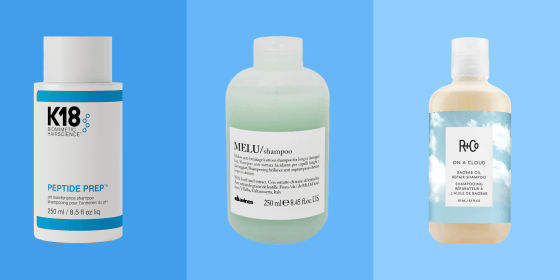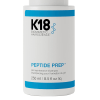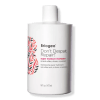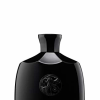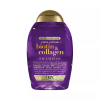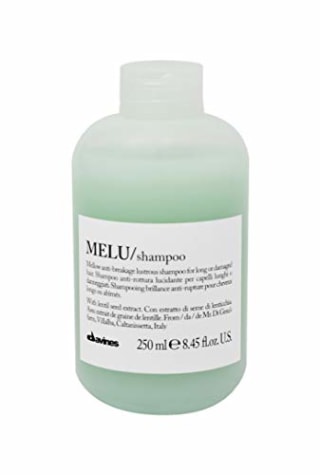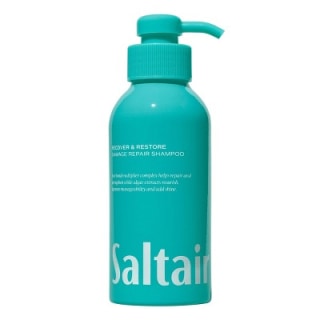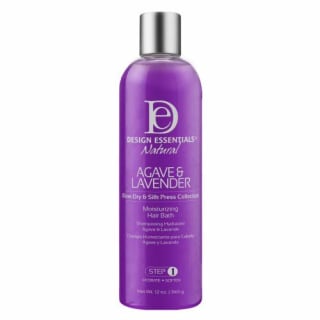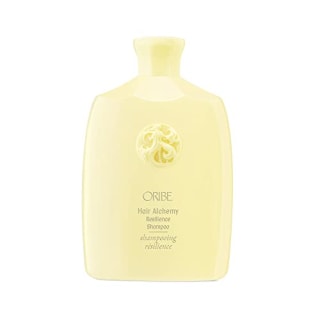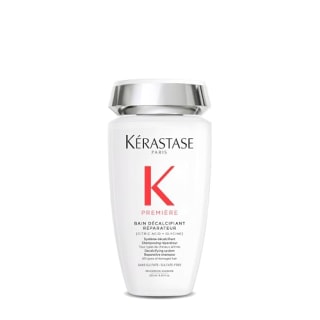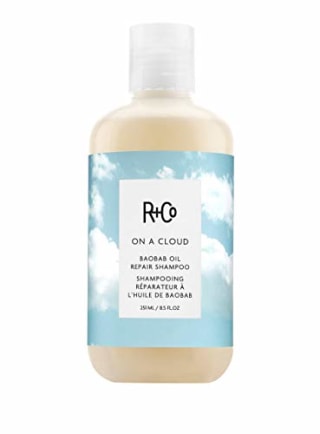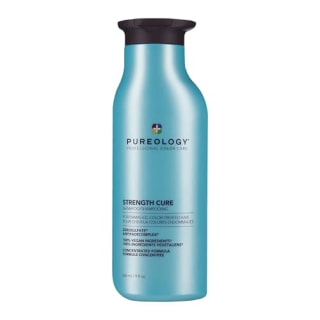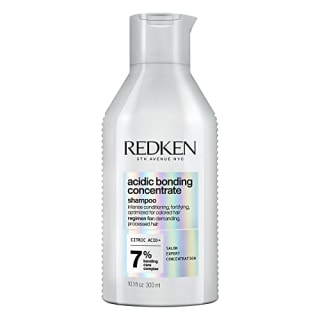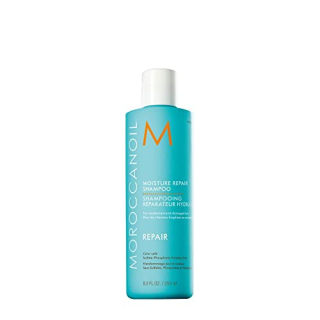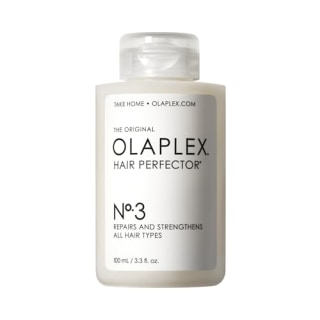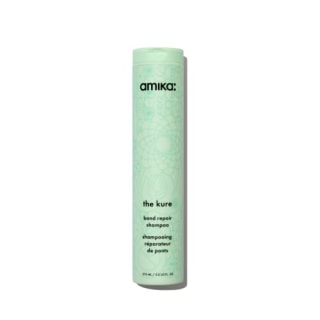Overprocessing your hair or leaving it unprotected when using hot tools can cause damage. It may lack elasticity, look frizzy and feel brittle, says Piersten Gaines, founder of Pressed Roots hair salons in Texas. Your hair may also have split ends, breakage, and a generally lackluster appearance. Trust me, after years of bleaching my dark brown hair — “dead” was the best way to describe how it looked. After talking to my hairstylist and other industry pros, I knew the best product to start my hair repair journey with (besides a haircut or salon treatment) was a protein- and moisture-rich shampoo.
If you’re in the same boat, I spoke to more experts about how to treat damaged hair and which shampoos are most helpful. I also compiled a list of highly rated options that align with their guidance.
SKIP AHEAD The best shampoos for damaged hair | How to shop for shampoo for damaged hair | Why trust NBC Select?
How I picked the best shampoo for damaged hair
To prevent hair damage along with its side effects, our experts recommend shopping for a shampoo with the following in mind:
- Ingredients: A shampoo for damaged hair ideally has proteins like keratin to strengthen the hair shaft, according to Gaines. You should also look for sulfate-free shampoos since they’ll strip less natural oils from the hair, according to Gaines.
- Hair type and texture: Finding a shampoo tailored to your hair type and texture is also essential for the best results, according to our experts. This list has options for all hair types and textures.
Want more from NBC Select? Sign up for our newsletter, The Selection, and shop smarter.
The best shampoo for damaged hair in 2025
Below, I rounded up expert-recommended shampoos for damaged hair with various types and textures in mind. I also included highly rated options that align with our expert’s guidance.
Best overall: K18 Peptide Prep pH Maintenance Shampoo
- Minimizes frizz
- Improves manageability
- Higher price point
- Scented
This gentle shampoo, suitable for all hair types, comes recommended by Jenna Pitocco, a hairstylist and co-owner of Love, Dunnette, a New York City-based salon. It rebuilds broken peptide bonds from chemical services and is a fantastic way to begin the recovery process, according to Pitocco. It also mimics the natural pH of your scalp, which prevents your hair cuticle from swelling and becoming damaged, according to the brand. It’s also safe for color-treated hair.
Best for coarse hair: Briogeo Don’t Despair, Repair Shampoo
- Rich consistency
- Intense moisture
- Strengthens hair
- May be hard to dispense
This option is great for those with textured hair who need hydration, according to Gaines. Its nourishing ingredients — including algae extract, panthenol and biotin — also help improve curl definition, says Gaines. Reviewers say their curls look shiny and soft, and have less breakage overall.
Best for medium/thick hair: Oribe Gold Lust Shampoo
- Strengthens hair
- Prevents future damage
- Adds shine
- Higher price point
This shampoo is like Botox for the hair because it helps correct damage and restores moisture, according to Brooke Jordan, a hairstylist and co-founder of The Bird House, a salon in Brooklyn, NY. The creamy formula is also powered by proteins that help strengthen your hair’s cuticles, according to the brand. It can be heavy for fine hair, so Jordan only recommends it for people with medium/thick hair.
Best for preventative care: Davines Melu Shampoo
- Reduces breakage
- Gentle formula
- Conditions hair
- Strong scent
This shampoo can help combat breakage, dullness and dryness for all hair types, according to Jordan. Its formula includes lentils, which are reparative and amino-acid rich (amino acids are the building blocks of the protein found in our hair), to protect and repair the hair, says Jordan. Reviewers say this made their hair — of various textures and types, including those with low porosity hair — feel soft and more manageable.
Best budget pick: Saltair Recover & Restore Damage Repair Shampoo
- Easy to dispense
- Conditions hair
- Reduces frizz
- Strong scent at first
After years of bleaching my thick, wavy hair, this drugstore shampoo is one of the only products to improve how it looks and feels. My hair feels less brittle and more hydrated with less breakage, especially when I pair it with the matching conditioner. Although it isn’t my favorite scent, it became more subtle after the initial wash.
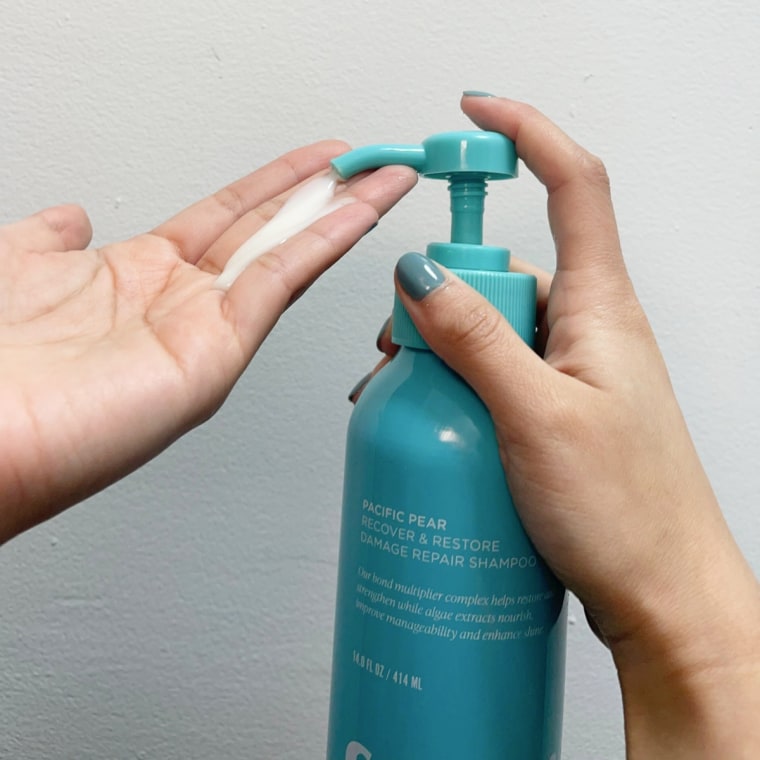
Best for curly/coily hair: Design Essentials: Agave and Lavender Moisturizing Hair Bath
- Improves manageability
- Moisturizing
- Reduces breakage
- Only for curly/coily textures
This moisturizing shampoo comes recommended by Gaines for those with dry, curly hair. It has ingredients like agave extract to strengthen and soften hair, and mango butter to add moisture, according to the brand. It also has lavender to help soothe the scalp, making it a healthy environment for hair growth.
Best for brittle hair: Oribe Hair Alchemy Resilience Shampoo
- Reduces breakage and shedding
- Prevents future damage
- Helps with lengthening
- Higher price point
This strengthening shampoo comes recommended by Jordan for people with fine and dry hair. It has hyaluronic acid, plant-based protein and daisy and honeysuckle extract to reinforce cuticle strength, prevent breakage and fortify brittle ends, according to the brand. Reviewers say a little goes a long way with this shampoo, and that it leaves an overall clean feeling.
Best splurge: Kérastase Première Bain Décalifiant Réparateur Repairing Shampoo
- Suitable for all hair types
- Strengthens hair
- Combats hard water
- Higher price point
For breakage-prone hair, consider this gentle option from Kérastase, which removes calcium buildup from hard water to make hair stronger and shinier, according to the brand. Reviewers say one bottle lasts a long time as a small amount creates a big enough lather to fully cleanse your hair and scalp. The brand also has a non-sulfate-free damage repair shampoo, Kérastase Resistance Bain Extentioniste Shampoo, which helps increase hair length.
Best scented: R+Co On a Cloud Baobab Oil Repair Shampoo
- Moisturizing
- Prevents future damage
- Gentle formula
- Scented
This strengthening shampoo comes recommended by Julie Davis, a hairstylist and owner of Eden West Salon in Charleston, South Carolina. It contains proteins to rebuild bonds within the hair, soybean oil for moisture retention and vitamin B5 and vitamin E for strength, according to the brand.
Best for color-treated hair: Pureology Strength Cure Shampoo for Damaged Hair
- Available in multiple sizes
- Suitable for all hair types
- 75+ washes in one bottle
- May be hard to squeeze out
If you have color-treated hair and are looking to keep it strong and healthy while still maintaining its color vibrancy, consider this option from Pureology. Reviewers say that despite its higher price point, it’s one of the best they’ve tried since it preserves their color and fixes damaged ends. When washed with its matching conditioner, reviewers say their hair looks soft, smooth, and shiny. They also say it’s worth the splurge because of how concentrated it is, so you only need a quarter-size amount to create an even lather that won’t feel greasy or weigh your hair down. It has a 4.6-star average rating from over 6,200 reviews on Amazon.
Best for split ends: Redken Acidic Bonding Concentrate
- Suitable for all hair types
- Improves manageability
- Long-lasting
- Strong scent
This shampoo strengthens damaged hair with ingredients like citric acid (an alpha hydroxy acid) to help reinforce weakened bonds in the hair, according to the brand. Apply a dime-size (fine hair), nickel-size (medium hair) or quarter-size (thick hair) amount and work it into a rich lather. Afterward, your hair will feel and look healthier, be easier to brush and appear smoother with reduced split ends and breakage, according to Redken.
Best for dry hair: Moroccanoil Moisture Repair Shampoo
- Multiple sizes available
- Improves manageability
- Moisturizing
- Nothing to note at this time
This shampoo repairs and moisturizes damaged hair without weighing it down, making it suitable for coarse and curly textures, even those who want to wear their hair in straight styles, says Gaines. The shampoo’s main ingredient is argan oil, a lightweight and nourishing ingredient with restorative properties to help strengthen the hair, reduce breakage, and help with overall manageability, according to Gaines.
Best pre-wash: Olaplex No. 3 Hair Perfector
- Suitable for all hair types
- Prevents future damage
- Strengthens hair
- Not a shampoo
Although this is technically not a shampoo, Jordan recommends this pre-wash, which she says helps relink the bonds that make up the molecular core of your hair. Not only does it build up those bonds, but it also helps reduce breakage, split ends, dryness and frizz, according to the brand. To use a pre-wash, dampen your hair and apply it from root to end and leave it on for three to ten minutes before rinsing; you’ll then follow it up with the bond repair shampoo, according to Olaplex.
Best for fine hair: Ogx Biotin & Collagen Extra Volume Extra Strength Shampoo
- Adds volume
- Moisturizing
- Lightweight
- May be hard to dispense
If you have fine and damaged hair, consider this volumizing and strengthening shampoo, which has a 4.2-star average rating from 1,850 reviews at Target. The shampoo has a combination of vitamins like vitamin B7 and proteins including collagen to help aid the overall health of your hair while thickening it without weighing down your hair, according to the brand. Reviewers say they notice less breakage in their fine hair after using this shampoo and feel and see more volume, moisture and shine.
Best for frizz: Amika The Kure Bond Repair Shampoo
- Prevents future damage
- Suitable for all hair types
- Lathers well
- Nothing to note at this time
This shampoo repairs, strengthens and moisturizes all hair types thanks to vegan protein, plant butters, bond technology and sea buckthorn, according to the brand. Reviewers say this bond-repair shampoo, which has a 4.7-star average rating from over 2,675 reviews on Amazon, helps correct damage, moisturize and reduce frizz. For the most effective results, double cleanse your hair by applying a quarter-sized amount of this shampoo to cleanse and then reapply it to maximize its benefits, according to Amika.
How to shop for shampoo for damaged hair
When determining which shampoo is best for your damaged hair, our experts recommend keeping your hair type and ingredients in mind.
Ingredients to look for
- Proteins: Ingredients such as keratin or wheat protein help strengthen the hair structure, reducing breakage and promoting overall hair health, says Gaines. You should also look for shampoos with amino acids, which are the molecules that form proteins, says Jordan.
- Vitamins and antioxidants: These will help protect the hair from any external, environmental damage, according to Jordan. Some common examples include vitamin A, vitamin B5 (panthenol) vitamin B7 (biotin), vitamin C and vitamin E, says Jordan.
- Moisturizing ingredients: Since you may experience dryness with damaged hair, finding formulas with ingredients like aloe vera, argan oil, glycerin, and natural oils will help, says Gaines.
- Know what to avoid: There are a few ingredients that may worsen the state of your damaged hair, so it’s best to avoid them when/if possible. Sulfates tend to strip the hair of natural oils, parabens can be harsh on the scalp, and alcohol may lead to dryness, according to Gaines.
Consistency
For damaged hair, a creamy or thicker consistency is preferable as it tends to be more moisturizing. Gels and thinner shampoos may be less hydrating and could potentially strip the hair of its natural oils, according to Gaines.
Hair type and texture
Choose shampoos specifically formulated for your hair type and lifestyle, says Gaines. For example, those with coarse hair may need extra moisture, those who have curly hair may benefit from formulas with frizz control, while those with coily hair may need moisturizing products that enhance natural curl patterns, according to Gaines.
Meet our experts
At NBC Select, we work with experts who have specialized knowledge and authority based on relevant training and/or experience. We also take steps to ensure all expert advice and recommendations are made independently and without undisclosed financial conflicts of interest.
- Julie Davis is a hairstylist, artistic director and owner of Eden West Salon in Charleston, South Carolina.
- Piersten Gaines is the founder of Pressed Roots, a group of hair salons throughout Texas.
- Jenna Pitocco is a hairstylist and co-owner of Love, Dunnette, a salon in New York City.
- Brooke Jordan is a hairstylist, co-founder and creative director of The Bird House, a salon in Brooklyn.
Why trust NBC Select?
I’m an associate reporter covering skin care and hair care, whose recent stories include roundups of the best leave-in conditioners and dry shampoos. For this story, I interviewed four experts and researched highly rated shampoos for damaged hair that were in line with expert guidance.
Catch up on NBC Select’s in-depth coverage of tech and tools, wellness and more, and follow us on Facebook, Instagram, Twitter and TikTok to stay up to date.
